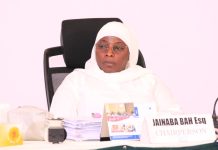By Kebba AF Touray
Louis Prom, Advisory Partner at Augustus Prom, has told lawmakers that the vast majority of companies linked to former President Yahya Jammeh were already dormant by the time his firm was appointed to oversee them.
Mr. Prom made the disclosure on Monday, August 4, 2025, while testifying before the Special Select Committee probing the sale and disposal of assets identified by the Janneh Commission as belonging to Mr. Jammeh.
He told the committee that most of the 17 companies placed under receivership were inactive, confirming that “the majority, I think 90 percent” of them were dormant.
At the start of his testimony, Mr. Prom confirmed that his firm received summons to produce documents and to testify. “Yes, we received two summons to produce,” he said when asked by Counsel Aji Saine Kah.
His written statement was marked by the committee as exhibit AP1A.
Mr. Prom described Augustus Prom as an established firm founded by his father in 1984, offering audit, tax, advisory, payroll, mergers and acquisitions, and insolvency services. He explained that their clients range from the Government of The Gambia and parastatals to international NGOs, multinational corporations, and donors such as the World Bank, the European Union, the African Development Bank, and the Islamic Development Bank.
Counsel Kah asked if Mr. Prom was aware that in 2017, the Government of The Gambia established a commission of inquiry to investigate the assets and financial dealings of Mr. Jammeh and his associates. He replied that he was aware of the establishment of the commission and that their appointment as receivers was by High Court orders.
Referencing a document marked MOJ 5A, Counsel Kah noted that the High Court, on May 22, 2017, appointed Augustus Prom as receiver. Mr. Prom read portions of the order:
“Augustus Prom, a firm of certified chartered accountants registered in The Gambia, be and hereby appoint the receiver and consequently the custody and control and is hereby granted to them of all companies listed in annexure 3 tied to this order for a proper administration thereof, pending the conclusion of the investigation by the Attorney General.”
The order further stated, “It is ordered pursuant to section 51 (5)(A) of the Act that the power granted under paragraph 8 above to Augustus Prom, a firm of chartered accountants registered in The Gambia, shall include the power in the case of perishable or apparently depreciating property to sell that property, including stocks and bonds.”
Counsel Kah pressed whether the firm had been contacted by the Attorney General’s Chambers prior to the High Court order. Mr. Prom replied in the affirmative.
“We had a phone call from one of the state counsels, Kimbeng Tah, and he gave us an overview of the engagement. By that time, Ministry of Justice already has our profile in terms of the services we offer and requested if we would be interested,” he said.
He testified that the firm discussed internally the risks, costs, and benefits before deciding to proceed, considering it was initially expected to be a six-month assignment. “Our profile and capacity, we told him we will engage,” he said.
After this, the Ministry of Justice sent them a letter. Mr. Prom said he could not recall the precise date of the initial call but confirmed it occurred before the court order.
When asked who was present at the first meeting, Mr. Prom said:
“They were present, the former Solicitor General, Cherno Marena, senior police officers, I believe the Registrar General was there as well, and Mr. Binger, the former Director of Civil Litigation. It was like a task force.”
He explained that the meeting was brief, lasting about 30 minutes, and that urgency was emphasized:
“It was not a long meeting, about 30 minutes. But I remember hearing the word, we have to move fast, because taking into account at that time the political context of Gambia, the former president had left, and he had a lot of valuable assets, over billions, and people were stealing, people were claiming.”
The meeting, he said, was to define the role of the police to provide security, the Registrar General to inspect the properties, and Augustus Prom to secure the companies.
“So was payment of fees for the firm discussed at this meeting?” Counsel Kah asked.
“No, it was not discussed at this meeting. There was another meeting. But to be honest, I can’t recall the dates. But it was around the time the order came,” he replied.
He explained that his firm later submitted a fee proposal, which was accepted by the Attorney General. “It was revolving around the rate of 10 percent and 100,000 for the dormant companies, for six months,” he said.
When asked whether the acceptance was in writing, he replied that it was.
Counsel Kah pressed on how they were notified of the final High Court order. Mr. Prom said:
“It was sent to us with a cover letter.”
Counsel then asked whether his firm visited the Sheriff’s Office to prepare notifications or request assistance to inform the companies now under their custody.
“No, I think the sheriff was part of the task force, but in the beginning, we were moving with the sheriff staff and Ministry of Justice staff, police officers. So once the order was out, we had to move fast. We were moving as a task force, but I don’t recall the firm contacting the sheriff’s division. Our main contact was the Ministry of Justice,” he said.
He added, “I cannot recall engaging the sheriff, but he knows he was part of the task force, so it’s possible it was requested. But, you know, taking into account it was six years ago, I don’t remember all the engagements and conversations.”
“Did the firm receive an invitation to join the task force? What was the invitation?” Counsel asked.
He said that he could not recall a formal invitation, but it was discussed at the first meeting and there was coordination by phone.
The meeting, he confirmed, was chaired by Solicitor General Marena:
“I remember the word, we have to move fast. Assets are being stolen every day.”
When asked what the firm did immediately afterward to secure the companies and their assets, Mr. Prom said that working with the task force, they first visited the abattoir in Abuko to serve the High Court order, then went to the KGI retail site on Kairaba Avenue, the bakery, and the butcher shop.
“The initial stage is what you call the due diligence stage, where you secure, collect information. We also notified the banks that there’s a receiver in place,” he said.
He added that they informed the Companies Registrar in compliance with the Companies Act and began collecting records. But in practice, most companies had no operational activity:
“But as stated earlier, most of these companies were dormant. The majority, I think 90 percent.”
Asked how he came to this conclusion, Mr. Prom explained:
“The information in terms of office location came from the task force. That’s how we were moving. We also visited the head office, but it was only a security guard. There was no activity.”



















